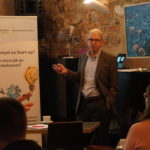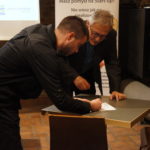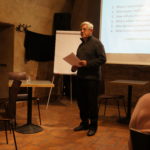SPCleantech as Pre-Accelarator Point for Polish start-ups organized on 14.11.2016 the fifth workshop “Pitch your business to investors and customers” of the series of 6 workshops and 2 conferences. The aim of the workshop was to provide experiences of Polish and Scandinavian mentors to Polish start-ups and coaches. SPCleantech is working with a group of experienced mentors from Denmark, Finland and Sweden.
You’re going to have to convince other people – A LOT of other people – that your startup is worth buying from, working for, and funding. And as the founder or cofounder, you’re going to have to do this yourself.
As the founder, you’re naturally the best salesperson for your startup. It doesn’t matter if you’re an engineer, a developer, a hacker, designer, or academic – this is your company, your passion, and even if you don’t have any sales or speaking experience, you’re still the best person to present your startup to the world.
Every company begins with a story. However, all good stories have one basic element: they’re about people, not things. You, your team, your customer, and your journey is the story – not your product.
Investors invest in people, not companies, and they generally invest in people they like, trust, and who they believe are capable – in that order. Always keep that in mind and frame your conversation in a way that immediately shows how you’re prepared to benefit them, not the other way around. The best business deals are win-win situations for both sides. Investors are also incredibly busy people and wasting their time is the easiest way to get a “NO” answer. Before you meet with an investor, spend time preparing. You only have one chance to make a first impression, so get it right!
You have a story to tell about your startup. Now, you need a way to tell it and someone to tell it to – preferably someone who will give you money to continue your story. To tell your story, you need a pitch: your business model as spoken to an investor.
In our workshop we have showed how to do it. We told how to tell your startup’s story, we explained what a pitch is, how to present your startup to different audiences, and what different types of pitches you will need to present. However, all of these things involve one basic activity – talking to people about your startup.
“You can tell a story in a sentence; you can tell a story in a paragraph; and you can tell a story in a 20-minute pitch. Startups need to do all three.” – Pitching Hacks
Presenting your business
- The founder is the best salesperson and spokesperson for their startup
- Practice presenting and speaking in public often before meeting investors
- Every startup has a story and it’s your job to tell yours
- You have to learn to talk about your startup in many different ways
- Every startup needs a high concept pitch, an elevator pitch, and a pitch deck
- A pitch deck is a presentation of 10-15 slides that describes your vision, team, and business model
- Learn to tailor your presentation to address different audiences
- Always consider the goals of your audience and what they want to hear
- Research an investor before the meeting, and come prepared
- Get out there and pitch!
Our mentors: Niels Mengel (DK) and Janusz Kahl
- Niels Mengel (DK)
- Janusz Kahl
















